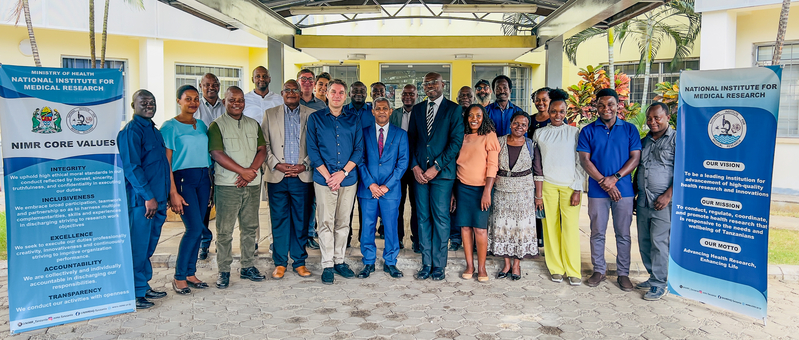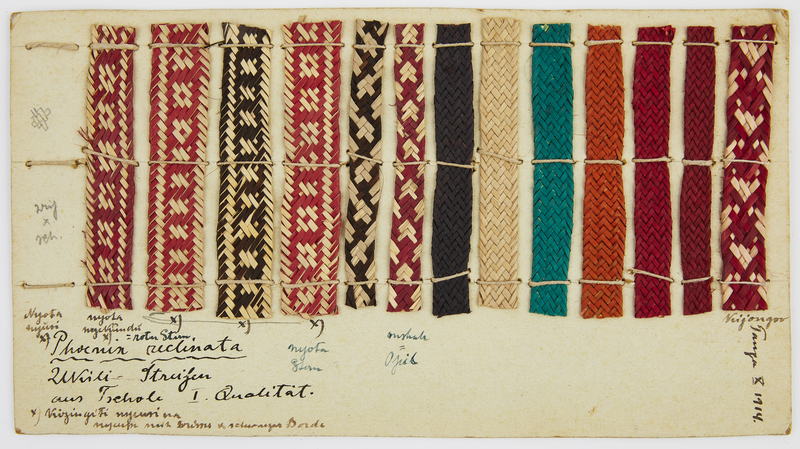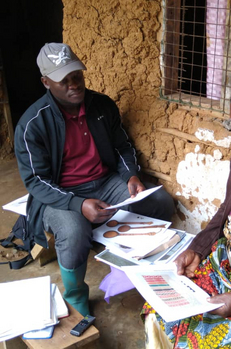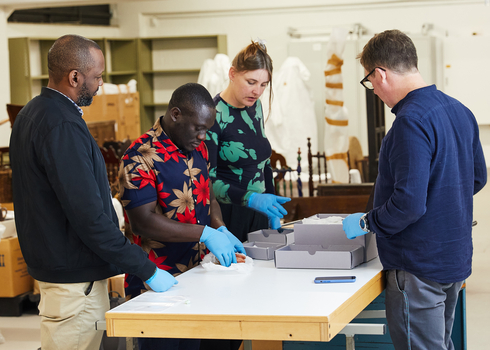
English version below
AMANI-STADE PROJEKT
Die Sammlung Karl Braun und die Rolle des Amani Instituts während der deutschen Kolonialzeit in Tansania
Projektlaufzeit: 15.05.2022 bis 30.09.2025
Im Mai 2022 wurde das Provenienzforschungsprojekt „Die Sammlung Karl Braun und die Rolle des Amani-Instituts während der deutschen Kolonialzeit in Tansania“ an den Museen Stade gestartet. Es wird in Kooperation mit dem National Institute for Medical Research (NIMR) durchgeführt und von der Stiftung Deutsches Zentrum Kulturgutverluste gefördert. Der Schwerpunkt liegt auf der Erforschung einer Sammlung von fast 600 Kulturgütern aus dem heutigen Tansania, die sich der Botaniker Karl Braun in der ehemaligen Kolonie "Deutsch-Ostafrika" angeeignet hat.
Die Forschungsergebnisse und Daten werden kontinuierlich in einer englischsprachigen Projekt-Wiki und einer dreisprachigen Online-Sammlung veröffentlicht. Derzeit werden die Ergebnisse in der Ausstellung AMANI kukita | kung’oa (gepflanzt | entwurzelt) vom 15. Februar bis 9. Juni 2025 an den Museen Stade präsentiert. Weitere Ausstellungsformate sind in Tansania geplant.
SAMMLUNGSGESCHICHTE
Im Jahr 1934 schenkte Karl Braun (1870–1935), der damalige Direktor der Biologischen Reichsanstalt für Land- und Forstwirtschaft in Stade, die sogenannte „Kolonialsammlung Braun“ der Stadt Stade. Erst 1997 wurde sie als Dauerleihgabe an die Museen Stade übergeben. Da die Kulturgüter scheinbar keinen Bezug zur regionalen und kulturellen Geschichte des Stader Raums hatten, blieben sie über Jahrzehnte unbeachtet, bis sie 2014 bei Renovierungsarbeiten im Museum Schwedenspeicher entdeckt wurden und das Forschungsprojekt begann.
Karl Braun hatte die Kulturgüter zwischen 1904 und 1920 während seiner Tätigkeit als Botaniker am Kaiserlich Biologisch-Landwirtschaftlichen Institut Amani (kurz: Amani Institut) erworben. Entsprechend dem imperialen Wettbewerbsgeist der europäischen Kolonialmächte verfolgte das Institut das erklärte Ziel, den größten botanischen Garten der Welt zu schaffen. Als Teil eines weitreichenden Netzwerks landwirtschaftlicher und botanischer Forschungseinrichtungen, das seit dem 19. Jahrhundert im Zuge der europäischen Kolonialexpansion entstand, leistete das Amani Institut auch einen bedeutenden Beitrag zum globalen Transfer invasiver Pflanzenarten und diente den wirtschaftlichen Interessen der deutschen Kolonialmacht. Die Forschung, Identifikation und Klassifikation durch Wissenschaftler zielten darauf ab, Pflanzen für Medizin, Landwirtschaft und Industrie nutzbar zu machen. Heute wird die ehemalige Forschungsstation vom NIMR als Amani Medical Research Centre betrieben.


Braun erwarb das kulturelle Erbe auf seinen Reisen durch die ehemalige Kolonie „Deutsch-Ostafrika“, profitierte aber auch davon, dass der Ort Amani aufgrund der klimatischen Bedingungen von zahlreichen Kolonialakteuren als „Erholungsort“ geschätzt wurde und somit als Umschlagplatz für Kulturgüter aus der gesamten Kolonie fungierte. Hinter der vielfältigen Sammlung – die Haushaltsgegenstände, Waffen, Schmuck, Instrumente und Textilien umfasst – wird Brauns botanisches Interesse an den Verarbeitungstechniken heimischer Materialien deutlich. Heute erzählen die Kulturgüter nicht nur etwas über die Traditionen der verschiedenen Gesellschaften, sondern vor allem über die Kontexte ihrer Aneignung, die Machtasymmetrien eines kolonialen Wissenstransfers und ihre Verstrickung in die Ausbeutung von menschlichen und pflanzlichen Ressourcen in der ehemaligen Kolonie.
FORSCHUNG
Im Projekt zielt das Forschungsteam darauf ab, das Netzwerk des Kulturerbtransfers im Kontext des Amani-Instituts zu erforschen und dabei kritisch die Herrschafts- und Ausbeutungsgeschichten dieser kolonialen Institution zu untersuchen. Es werden die Provenienzen der Kulturgüter untersucht, mögliche Kontexte gewaltsamer Aneignung sowie die Rolle von Karl Braun im Rahmen der deutschen Kolonialgeschichte und ihrer Verbindung zum Amani Institut. Eine gründliche Analyse der Gründungsgeschichte, Ziele, Aktivitäten, Einflussnahme und Rezeption des Instituts ist essenziell, um die Mechanismen von Macht und Kontrolle zu verstehen, die in seinem kolonialen Erbe eingebettet sind.


AMANI-STADE PROJECT
The Karl Braun collection and the role of the Amani Institute during the German colonial period in Tanzania
Project duration: 15. May 2022 until 30. September 2025
In May 2022, the provenance research project "The Karl Braun Collection and the role of the Amani Institute during the German colonial period in Tanzania" was launched at the Museen Stade. It is being carried out in cooperation with the National Institute for Medical Research (NIMR) and funded by the German Lost Art Foundation. The focus is on researching a collection of almost 600 cultural belongings from today’s Tanzania, which the botanist Karl Braun acquired in the former colony of "German East Africa".
The research results and data will be continuously published in a Project-wiki and in an trilingual Online collection. Currently the results will be made accessible in the form of the exhibition AMANI kukita | kung’oa (rooted | uprooted) from 15 February to 9 June 2025 at the Museen Stade. Further exhibition formats are planned in Tanzania.
COLLECTION HISTORY
In 1934, Karl Braun (1870–1935), the then director of the Biological Imperial Institute for Agriculture and Forestry Department Stade (Biologische Reichsanstalt für Land- und Forstwirtschaft Zweigstelle Stade), donated the so-called "Colonial Collection Braun" (Kolonialsammlung Braun) to the city of Stade. It was not until 1997 that it was finally handed over to the Museen Stade on permanent loan. As the cultural assets seemed to have no connection to the regional and cultural history of the Stade region, they remained unnoticed for decades until they were finally discovered during renovation work in the Schwedenspeicher in 2014 and the research project was initiated.
Karl Braun had acquired the cultural assets between 1904 and 1920 during his work as a botanist for the Imperial Biological-agricultural Institute Amani (Kaiserlich Biologisch-Landwirtschaftliches Institut Amani, short: Amani Institute). In line with the imperial competitive spirit of the European colonial powers, the declared aim of the institute was to create the largest botanical garden in the world. As part of a far-reaching network of agricultural and botanical research facilities that had been established in the course of European colonial expansion since the 19th century, the Amani Institute also made a significant contribution to the global transfer of invasive plant species and asserted the economic interests of the German colonial power. Research, identification and classification by scientists aimed to make plants usable for medicine, agriculture and industry. Today, the former research station is operated by the NIMR as the Amani Medical Research Centre.

Braun appropriated the cultural heritage on his trips through the former "German East Africa", but also benefited from the fact that the town of Amani was valued as a 'holiday resort' by numerous colonial actors due to the climatic conditions and thus acted as a transshipment point for cultural belongings from the entire colony. Behind the diverse collection – which includes household objects, weapons, jewellery, instruments and textiles – Braun's botanical interest in the processing techniques of native materials is evident. Today, the cultural belongings not only tell us something about the traditions of the various communities of practice, but above all about the contexts of their appropriation, the power asymmetries of a colonial transfer of knowledge and their involvement in the exploitation of natural and human resources in the former colony.
RESEARCH
In the project, the research team aims to explore the network of cultural heritage transfer within the context of the Amani Institute, while critically examining the histories of domination and exploitation associated with this colonial institution. It investigates the provenances of the cultural assents, and thereby potential contexts of violent appropriation as well as the role of Karl Braun, all within the framework of German colonial history as it relates to the Amani Institute. A thorough analysis of the institute’s founding history, objectives, activities, influence, and reception is essential for understanding the mechanisms of power and control embedded in its colonial legacy.


FORSCHUNGSTEAM | RESEARCH TEAM
Dr. Peter Mangesho | National Institute for Medical Research, Amani Medical Research Center
Dr. Sebastian Möllers | Museen Stade
Antonia Schmidt | Museen Stade
Mohamed Seif | National Institute for Medical Research, Amani Medical Research Center
Lea Steinkampf | Museen Stade
WEITERE INFORMATIONEN | FURTHER INFORMATION
AMANI kukita | kung'oa: Ausstellung | Exhibition
Begleitprogramm | Events
Bildergalerie | Picture gallery
Projekt-Wiki | Project wiki
Online Sammlung | Online collection
Stadtrundgang Kolonialgeschichte | City Tour Colonial History
Wenn Sie unseren Projekt-Newsletter abonnieren wollen, oder aber Fragen, Anmerkungen und Kritik haben senden Sie uns bitte eine Mail an: sammlung-braun[at]museen-stade[dot]de.
If you would like to subscribe to our project newsletter, or if you have any questions, comments or criticisms, please send us an email at: sammlung-braun[at]museen-stade[dot]de.
PRESSEMITTEILUNGEN | PRESS RELEASES
14.02.2023 Museen Stade erforschen Sammlung aus kolonialen Kontexten
14.02.2023 Museen Stade explore collection from colonial contexts
PRESSESPIEGEL | PRESS REVIEW
- Iris Mydlach: Stader Museen stellen sich kolonialem Erbe, Hamburger Abendblatt, 21.02.2023
- Pauline Meyer: Kolonialzeit wird jetzt aufgearbeitet, Stader Wochenblatt, 02.03.2023
- Janina Possel: Kolonialforschung, Radiobeitrag NDR, März 2023
- Petra Schellen: „Die bürokratische Distanz ist eine Form der Gewalt“, Interview mit Lea Steinkampf, TAZ nordkultur, 25. 05.2023
SONSTIGE VERÖFFENTLICHUNGEN | FURTHER PUBLICATIONS
Sebastian Möllers & Lea Steinkampf: Stade Museums: a colonial era collection is being researched together with partner institutions in Tanzania, EXPOTIME 02_2023
SOCIAL MEDIA
#AmaniStadeProject
#CollectionKarlBraun



